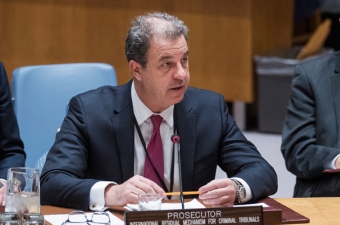Prosecutor Serge Brammertz of the International Criminal Tribunal for the former Yugoslavia (ICTY) and the Mechanism for International Criminal Tribunals (MICT) today addressed the United Nations Security Council (UNSC).
In his address, Prosecutor Brammertz updated the UNSC on the ICTY’s final trial and appeal, the MICT’s trial and appeals, the search for the remaining eight fugitives indicted by the International Criminal Tribunal for Rwanda (ICTR) and the provision of assistance to national jurisdictions prosecuting war crimes committed in the former Yugoslavia and Rwanda.
The Prosecutor began by noting that closing arguments are currently underway in the Mladić case, the ICTY’s final trial and one of the most important cases in its history. He reported that the Mladić trial judgment and the judgment in the Prlić et al. case, the ICTY’s final appeal, are both expected by the end of November 2017. The Prosecutor also updated the UNSC on the status of trial and appeal proceedings before the MICT, including the filing of appeal briefs in Karadzic and Šešelj.
Turning to state cooperation with the ICTY and MICT, the Prosecutor stated that the Office of the Prosecutor (OTP) “echoes President Agius’ grave concern that Serbia continues to ignore and breach its legal obligations to cooperate with the Tribunal.”
Regarding the search for the remaining eight fugitives indicted by the ICTR, Prosecutor Brammertz informed the UNSC that the OTP has developed strategies to locate and arrest each of the fugitives. He said, “All victims share the same hope: to see those responsible for the crimes against them brought to justice. And so it remains of critical importance that these eight fugitives are arrested and stand trial.”
In relation to Rwanda, the Prosecutor reported that the OTP’s cooperation with the National Public Prosecution Authority and the Prosecutor-General remains smooth and effective. He also highlighted that Rwandan authorities have identified more than 500 suspects in other countries, and encouraged those countries to work with Rwandan authorities and ensure these cases are completed.
With respect to national prosecutions of war crimes in the former Yugoslavia, the Prosecutor recognized positive developments in the work of the Prosecutor’s Office of Bosnia and Herzegovina. However, he noted that regional judicial cooperation experienced a significant setback with the failure by Serbian authorities to enforce the war crimes conviction in the Đukić case.
Prosecutor Brammertz further reported, “As long as the political environment and mindset do not support war crimes justice, it will be extremely difficult to meet the public’s legitimate expectations for meaningful accountability.” He explained that there is little evidence Serbia is implementing its commitments to support war crimes prosecutions. He also urged Croatia to bring its policies in line with its commitments. The Prosecutor expressed the OTP’s concerns that politicians and government officials from the region are undermining trust in judicial accountability for war crimes, and informed the UNSC that the glorification of war criminals continues.
The Prosecutor concluded, “On behalf of the Offices of the Prosecutor of the ICTR, ICTY and MICT, I thank Secretary-General Ban Ki-Moon for standing behind us and giving us his full support, and I look forward to our continued cooperation with Secretary-General designate Antonio Guterres.”


